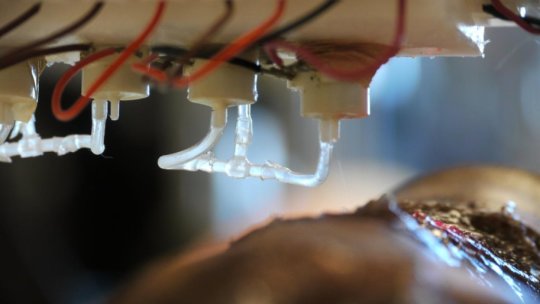Skin cells taken from patients with a rare genetic disorder are up to ten times more sensitive to damage from ultraviolet A (AVA) radiation in laboratory tests, than those from a healthy population, according to new research from the University of Bath. It is hoped that the work, which has involved designing a brand new molecule with potential to be added to sun cream, could benefit those with Friedrich’s Ataxia (FA), as well as those with other disorders characterised by mitochondrial iron overload, notably Wolfram Syndrome and Parkinson’s disease, where…
Read MoreCategory: Skincare
Mobile bedside bioprinter can heal wounds
Imagine a day when a bioprinter filled with a patient’s own cells can be wheeled right to the bedside to treat large wounds or burns by printing skin, layer by layer, to begin the healing process. That day is not far off. Wake Forest Institute for Regenerative Medicine (WFIRM) scientists have created such a mobile skin bioprinting system — the first of its kind — that allows bi-layered skin to be printed directly into a wound. “The unique aspect of this technology is the mobility of the system and the…
Read MoreExclusive breastfeeding lowers odds of some schoolchildren having eczema
Children exclusively breastfed for the first three months of life had significantly lower odds of having eczema at age 6 compared with peers who were not breastfed or were breastfed for less time, according to preliminary research presented during the American Academy of Allergy, Asthma & Immunology 2019 Annual Meeting. Eczema is a chronic condition characterized by extremely itchy skin that, when scratched, becomes inflamed and covered with blisters that crack easily. While genes and the environment are implicated in this inflammatory disease, many questions remain unanswered, such as how…
Read MoreReview of modern cases of leprosy
Leprosy has a history that has spanned centuries and societies across the globe. Yet, it continues to be a problem — even in the modern era. Sufferers from the chronic and infectious skin disease still face the social stigma and lack of medical care that people have endured since the origins of the disease itself. Although leprosy can be treated, the World Health Organization reported 216,108 cases in 2016, with some of these patients seeking treatment at Mayo Clinic’s Rochester campus. Looking at risk factors and demographic information of sufferers,…
Read MoreSalt could be a key factor in allergic immune reactions
Salt apparently affects allergic immune reactions. A team working with Prof. Christina Zielinski at the Technical University of Munich (TUM) has demonstrated in cell cultures that salt leads to the formation of Th2 cells. These immune cells are active in allergic conditions such as atopic dermatitis. The team also detected elevated salt concentrations in the skin of patients. In industrial countries, nearly one in three people are affected by allergies at some point in their lives. One in ten children suffer from atopic dermatitis. T-cells play an important role in…
Read More




